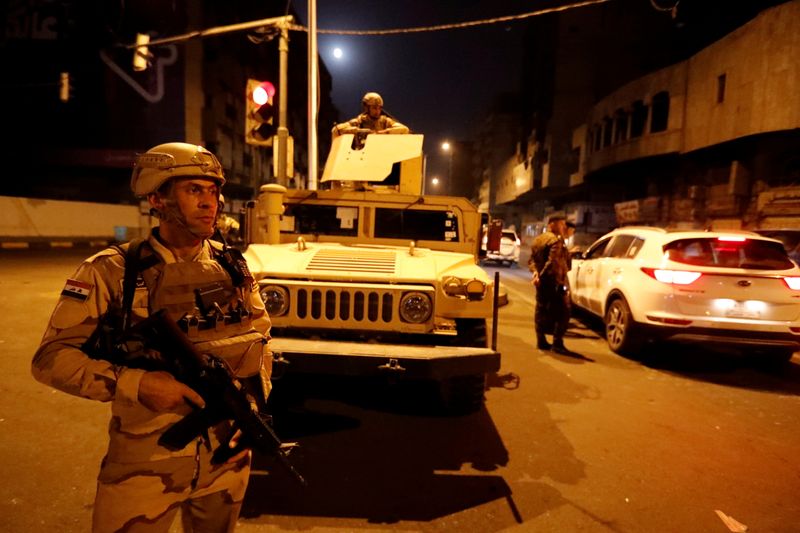
FILE PHOTO: Iraqi soldiers take part in an intensive security deployment in Baghdad, Iraq, May 26, 2021. REUTERS/Thaier Al-Sudani/File Photo
June 23, 2021
By Amina Ismail
BAGHDAD (Reuters) – Iraq’s government appears increasingly weak in the face of militias and parties that are expected to entrench their power in an upcoming election, dashing the hopes of protesters who were promised reform, say activists, officials and diplomats.
The Baghdad government has painted an early vote in October as the answer to Iraq’s woes, and the West has thrown its support behind Prime Minister Mustafa al-Kadhimi and President Barham Salih in calling for the election, which the United Nations has agreed to monitor.
But a series of recent events have demonstrated the impunity of paramilitary groups mainly aligned to Iran. Iraq’s biggest parties – all linked to armed groups – are already positioning themselves to divide up election spoils while pro-reform activists are gunned down in the streets.
“The Iraqi state is not in control of the situation,” said Hanaa Edwar, a prominent Iraqi rights activist. “Activists and candidates are being assassinated and threatened. It will be very difficult to hold (free) elections in these circumstances.”
A government official, speaking on condition of anonymity, said militias are “stronger than the state itself … the old guard are in control. An internationally-monitored election will just lend them legitimacy.”
A spokesperson for the government was not immediately available to comment.
After the United States invaded Iraq in 2003, toppling its Sunni Muslim leader Saddam Hussein, Shi’ite parties aligned with Iran dominated state institutions and successive governments.
In late 2019, huge crowds of Iraqis took part in mass protests calling for the removal of that elite. Hundreds of protesters were killed when the security forces and militia fired on the demonstrators. The government of the day was forced to resign.
Since then, interim premier Kadhimi has promised to hold to account people responsible for the killing of protesters, and enact electoral reform for a vote that would weaken the grip of armed groups.
But almost two years later, no one has been successfully prosecuted for killing protesters. The old elite appears on track to strengthen its power, and activists complain that political freedoms have eroded even further.
The United Nations says at least 32 anti-establishment activists have died in targeted killings by unidentified armed groups since October 2019. Iraqi officials privately blame groups allied to Iran, although those groups deny any role.
For Hisham al-Mozany, an activist who had co-founded a new political party, it was a series of deployments by supporters of rival militias in Baghdad this year that scared his party off from running in elections.
“There’s no law and order in Baghdad, no (strong) security apparatus … the state is dying,” he said.
In February, armed supporters of cleric Muqtada al-Sadr paraded through Baghdad over what Sadr said was over a threat to Shi’ite holy sites. In March, supporters of Iran-aligned militias took to the streets over government delays in passing an annual budget. On both occasions state security forces did not intervene.
Last month, militiamen deployed inside Baghdad’s fortified Green Zone, which houses government buildings. The militiamen were demanding the release of Qasim Muslih, a senior paramilitary commander arrested for what government and security officials said was involvement in killing activists and firing rockets at a U.S. base. Two weeks later, Muslih was freed.
NEW LAW, OLD PARTIES
Activists including Mozany continue to be threatened. “I left my home after (militias) raided my home and torched my car,” he said.
The ongoing intimidation and impunity is creating an environment in which big parties and groups linked with militias will do well in the October vote, officials and diplomats say.
Iraq passed a new election law in 2019 that in theory favours independent candidates, a move meant to encourage young, pro-democracy candidates to run. But so far, few are standing.
“Security is one of the main reasons I haven’t yet announced my candidacy,” said one activist, on condition of anonymity. “I don’t feel safe if I do so.”
A spokesperson for Iraq’s election commission said many registered candidates had recently withdrawn.
Meanwhile, the old parties say they are feeling confident ahead of the election.
“We meet regularly at someone’s home and discuss alliances. We know each other from many years back, we’re on speaking terms no matter the general political tension,” said the leader of one party.
Activists have lost all hope.
Mohammed Aldhamat, whose brother Amjad was gunned down in a targeted killing in 2019, said he would boycott the election entirely.
“There’s no point taking part,” he said.
(Reporting by Amina Ismail; Writing and additional reporting by John Davison; Editing by Peter Graff)



